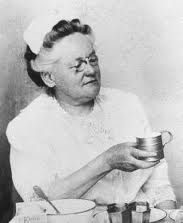This is your morning Open Thread. Pour your favorite beverage and review the past and comment on the future.
Find the past “On This Day in History” here.
August 23 is the 235th day of the year (236th in leap years) in the Gregorian calendar. There are 130 days remaining until the end of the year.
On this day in 1902, pioneering cookbook author Fannie Farmer, who changed the way Americans prepare food by advocating the use of standardized measurements in recipes, opens Miss Farmer’s School of Cookery in Boston. In addition to teaching women about cooking, Farmer later educated medical professionals about the importance of proper nutrition for the sick.

Farmer was born March 23, 1857, and raised near Boston, Massachusetts. Her family believed in education for women and Farmer attended Medford High School; however, as a teenager she suffered a paralytic stroke that turned her into a homebound invalid for a period of years. As a result, she was unable to complete high school or attend college and her illness left her with a permanent limp. When she was in her early 30s, Farmer attended the Boston Cooking School. Founded in 1879, the school promoted a scientific approach to food preparation and trained women to become cooking teachers at a time when their employment opportunities were limited. Farmer graduated from the program in 1889 and in 1891 became the school’s principal. In 1896, she published her first cookbook, The Boston Cooking School Cookbook, which included a wide range of straightforward recipes along with information on cooking and sanitation techniques, household management and nutrition. Farmer’s book became a bestseller and revolutionized American cooking through its use of precise measurements, a novel culinary concept at the time.
Cookbook fame

Fannie published her most well-known work, The Boston Cooking-School Cook Book, in 1896. Her cookbook introduced the concept of using standardized measuring spoons and cups, as well as level measurement. A follow-up to an earlier version called Mrs. Lincoln’s Boston Cook Book, published by Mary J. Lincoln in 1884, the book under Farmer’s direction eventually contained 1,849 recipes, from milk toast to Zigaras à la Russe. Farmer also included essays on housekeeping, cleaning, canning and drying fruits and vegetables, and nutritional information.
The book’s publisher (Little, Brown & Company) did not predict good sales and limited the first edition to 3,000 copies, published at the author’s expense. The book was so popular in America, so thorough, and so comprehensive that cooks would refer to later editions simply as the “Fannie Farmer cookbook”, and it is still available in print over 100 years later.
Farmer provided scientific explanations of the chemical processes that occur in food during cooking, and also helped to standardize the system of measurements used in cooking in the USA. Before the Cookbook’s publication, other American recipes frequently called for amounts such as “a piece of butter the size of an egg” or “a teacup of milk.” Farmer’s systematic discussion of measurement – “A cupful is measured level … A tablespoonful is measured level. A teaspoonful is measured level.” – led to her being named “the mother of level measurements.”
I still have my copy.
79 – Mount Vesuvius begins stirring, on the feast day of Vulcan, the Roman god of fire.
1305 – William Wallace, Scottish patriot, is executed for high treason by Edward I of England.
1328 – Battle of Cassel: French troops stop an uprising of Flemish farmers.
1514 – Battle of Chaldiran ended with a decisive victory for the Sultan Selim I, Ottoman Empire, over the Shah Ismail I, Safavids founder.
1541 – French explorer Jacques Cartier lands near Quebec City in his third voyage to Canada.
1555 – Calvinists are granted rights in the Netherlands.
1572 – Mob violence against Huguenots in Paris – St. Bartholomew’s Day massacre.
1775 – King George III declares that the American colonies exist in a state of open and avowed rebellion.
1784 – Western North Carolina (now eastern Tennessee) declares itself an independent state under the name of Franklin; it wasn’t accepted into the United States, and only lasted for four years.
1793 – French Revolution: a levee en masse is decreed by the National Convention.
1799 – Napoleon leaves Egypt for France en route to seize power.
1839 – The United Kingdom captures Hong Kong as a base as it prepares for war with Qing China. The ensuing 3-year conflict will later be known as the First Opium War.
1858 – The Round Oak rail accident occurs in Brierley Hill in the Black Country, England. It is ‘Arguably the worst disaster ever to occur on British railways’.
1864 – The Union Navy captures Fort Morgan, Alabama, thus breaking Confederate dominance of all ports on the Gulf of Mexico.
1866 – Austro-Prussian War ends with the Treaty of Prague.
1873 – Albert Bridge in Chelsea, London opened.
1896 – First Cry of the Philippine Revolution is made in Pugad Lawin (Quezon City), in the province of Manila.
1904 – The automobile tire chain is patented.
1914 – World War I: Japan declares war on Germany and bombs Qingdao, China.
1914 – World War I: the Battle of Mons; the British Army begins withdrawal.
1921 – British airship R-38 experiences structural failure over Hull in England and crashes in the Humber estuary. Of her 49 British and American training crew, only 4 survive.
1923 – Capt. Lowell Smith and Lt. John P. Richter performed the first mid-air refueling on De Havilland DH-4B, setting an endurance flight record of 37 hours.
1927 – Sacco and Vanzetti are executed.
1929 – Hebron Massacre during the 1929 Palestine riots: Arab attack on the Jewish community in Hebron in the British Mandate of Palestine, continuing until the next day, resulted in the death of 65-68 Jews and the remaining Jews being forced to leave the city.
1938 – English cricketer Len Hutton sets a world record for the highest individual Test innings of 364, during a Test match against Australia.
1939 – World War II: Germany and the Soviet Union sign a non-aggression treaty, the Molotov-Ribbentrop Pact. In a secret addition to the pact, the Baltic states, Finland, Romania, and Poland are divided between the two nations.
1942 – World War II: Beginning of the Battle of Stalingrad.
1943 – World War II: Kharkov liberated.
1944 – World War II: Marseille liberated.
1944 – World War II King Michael of Romania dismisses the pro-Nazi government of General Antonescu, who is arrested. Romania switches sides from the Axis to the Allies.
1944 – Freckleton Air Disaster – A United States Army Air Forces B-24 Liberator bomber crashes into a school in Freckleton, England killing 61 people.
1946 – Ordinance No. 46 of the British Military Government constitutes the German Land (state) of Schleswig-Holstein.
1954 – First flight of the C-130 Hercules transport aircraft.
1958 – Chinese Civil War: The Second Taiwan Strait crisis begins with the People’s Liberation Army’s bombardment of Quemoy.
1966 – Lunar Orbiter 1 takes the first photograph of Earth from orbit around the Moon.
1975 – Successful Communist coup in Laos
1977 – The Gossamer Condor wins the Kremer prize for human powered flight.
1979 – Soviet dancer Alexander Godunov defects to the United States.
1982 – Bachir Gemayel is elected Lebanese President amidst the raging civil war.
1985 – Hans Tiedge, top counter-spy of West Germany, defects to East Germany.
1989 – Hungary: the last communist government open the Iron curtain and causes the exodus of thousands of Eastern Germans to West Germany via Hungary (September 11).
1989 – Singing Revolution: two million people from Estonia, Latvia and Lithuania stand on the Vilnius-Tallinn road, holding hands (Baltic Way).
1989 – 1,645 Australian domestic airline pilots resign after the airlines threaten to fire them and sue them over a dispute.
1990 – Saddam Hussein appears on Iraqi state television with a number of Western “guests” (actually hostages) to try to prevent the Gulf War.
1990 – Armenia declares its independence from the Soviet Union.
1990 – West Germany and East Germany announce that they will unite on October 3.
1994 – Eugene Bullard, The only black pilot in World War I, is posthumously commissioned as Second Lieutenant in the United States Air Force.
1996 – Osama bin Laden issues message entitled ‘A declaration of war against the Americans occupying the land of the two holy places.’
2000 – Gulf Air Flight 072 crashes into the Persian Gulf near Manama, Bahrain, killing 143.
2006 – Natascha Kampusch, who had been abducted at the age of ten, escapes from her captor Wolfgang Priklopil, after eight years of captivity.
2007 – The skeletal remains of Alexei Nikolaevich, Tsarevich of Russia, and his sister Anastasia are found near Yekaterinburg, Russia.
2010 – Manila hostage crisis, in which eight hostages were killed
2011 – A magnitude 5.8 (class: moderate) earthquake occurs in Virginia. Damage occurs to monuments and structures in Washington D.C. and the resulted damage is estimated at $200 million – $300 million USD.
2011 – Libyan leader Muammar Gaddafi is overthrown after the National Transitional Council forces take control of Bab al-Azizia compound during the 2011 Libyan civil war.
* Black Ribbon Day
* Christian Feast Day:
*Philip Benitius
* Rose of Lima
* Eogan of Ardstraw
* Tydfil
* August 23 (Eastern Orthodox liturgics)
* European Day of Remembrance for Victims of Stalinism and Nazism (European Union)
* Father’s Day (Nepal)
* Flag Day (Ukraine)
* International Day for the Remembrance of the Slave Trade and its Abolition (International)
* Umhlanga Day (Swaziland)
* Vulcanalia (Roman Empire)

Recent Comments